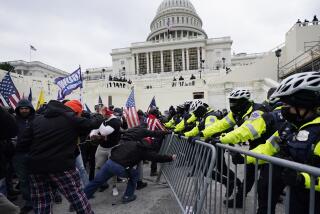Leakers, loyalty and Russian hookers: Comey memos allege Trump’s fixations in early days
Reporting from Washington — They are among the most storied memos in recent Washington history.
Under pressure from Republicans, the Justice Department on Thursday sent Congress the seven memos, spanning 15 pages, that then-FBI Director James B. Comey wrote over four months early last year about his interactions with President Trump. The memos, which quickly leaked to reporters, closely track Comey’s congressional testimony, interviews and his new book, “A Higher Loyalty.” They also offer colorful new details about a president fixated on jailing leakers and in disproving salacious allegations against him.
What are the memos, and why did Comey write them?
Comey started writing the memos after his first one-on-one conversation with Trump in January 2017 and shared them with FBI leadership. He had not taken notes after his meetings with President Obama, but Comey has said he wanted to make a contemporaneous record of his discussions with Trump because he feared they could be misrepresented. He clearly wrote them with an idea that they might become public.
Why are the memos important?
After Trump fired Comey in May, Comey wanted it known that Trump had pressured him to back off an FBI investigation of Michael Flynn, the national security advisor who was fired and later pleaded guilty to lying to the FBI about his contacts with Russians. Comey told a friend to share excerpts from the memos with reporters. That disclosure, which raised questions of possible obstruction of justice by Trump, was a factor in Deputy Atty. Gen. Rod Rosenstein’s decision to appoint special counsel Robert S. Mueller III.
How does President Trump come off in the memos?
Terrible. According to Comey, Trump delivered a “conversation-as-jigsaw puzzle” monologue about the size of the crowd at his inauguration, about luxury in the White House, about allegations that he had consorted with prostitutes in Moscow, and about Hillary Clinton’s supposed crimes. Comey writes that he grew increasingly uncomfortable in his meetings with Trump.
Why are we seeing the memos now?
House Republicans have demanded numerous records from the Justice Department as they scrutinize how it handled both the Russia and the Clinton investigations. Rep. Devin Nunes (R-Tulare), the House Intelligence Committee chairman, used some of the material to issue his own memo, which criticized court-approved eavesdropping of Carter Page, a former Trump campaign aide who visited Moscow during the campaign. Republicans sought the Comey memos in hopes they would reveal contradictions between his writings at the time and his subsequent congressional testimony and memoir.
What are Republicans and Democrats saying about the Comey memos?
Republicans highlighted that Comey never wrote before he was fired that Trump was obstructing justice in the Russia investigation. Trump tweeted that the Comey memos show “NO COLLUSION and NO OBSTRUCTION,” and he accused Comey of leaking classified information, which Comey has denied.
Democrats say Republicans are misreading the memos. Rep. Adam B. Schiff (D-Burbank), top Democrat on the House Intelligence Committee, called them “important evidence on the issue of potential obstruction of justice.”
What’s new about Michael Flynn?
According to Comey, Trump expressed concern days after he took office that Flynn had “serious judgment issues,” a startling claim about the president’s top national security aide. At issue, Comey writes, was Flynn’s failure to advise Trump of a phone call nearly a week earlier from an unspecified foreign leader, reportedly Russian President Vladimir Putin. Comey also writes that Reince Priebus, then Trump’s chief of staff, asked him on Feb. 8, 2017, whether Flynn was under FBI surveillance. The answer is redacted.
What did Trump say about Russia?
According to Comey, Trump never asked what Russia did to interfere in the 2016 election. Instead, he was fixated on rebutting an allegation, from a dossier compiled by a former British spy, that Russian intelligence had evidence that Trump had asked prostitutes to urinate on a bed in his hotel suite in Moscow in 2013 because President Obama had slept there. The president asked Comey to disprove the charge to reassure his wife, Melania, that it was untrue, and brought the issue up several times. In a February 2017 meeting in the Oval Office, Trump said that “‘the hookers thing’ is nonsense” but that Putin had told him, “we have some of the most beautiful hookers in the world,” Comey wrote. Part of that account also is redacted.
What did he ask Comey to do about media leaks?
Trump pressured Comey to shut down leaks and called for prosecution of leakers. Comey said he agreed that he “would like to nail one to the door as a message,” but cautioned Trump that getting convictions was difficult and often hinged on pursuing reporters. Trump was enthusiastic about jailing reporters, mentioning former New York Times reporter Judith Miller, who spent 85 days in jail in 2005 for refusing to testify to a grand jury in a leak investigation.
How did Trump see the role of the FBI?
In Comey’s telling, he tried to explain to Trump that the bureau needed to be free of political influence — but suggests the message didn’t sink in. In a now-familiar account, Comey describes several conversations when Trump pressed him for “loyalty,” and Comey tried not to react and to say as little as possible. Comey says he repeatedly defended then-FBI Deputy Director Andrew McCabe. That message didn’t take either. Under continued pressure from Trump, Atty. Gen. Jeff Sessions fired McCabe in March, after an internal report says he “lacked candor” in his answers about authorizing leaks.
To read this article in Spanish, click here
Twitter: @jtanfani
More to Read
Get the L.A. Times Politics newsletter
Deeply reported insights into legislation, politics and policy from Sacramento, Washington and beyond. In your inbox three times per week.
You may occasionally receive promotional content from the Los Angeles Times.












